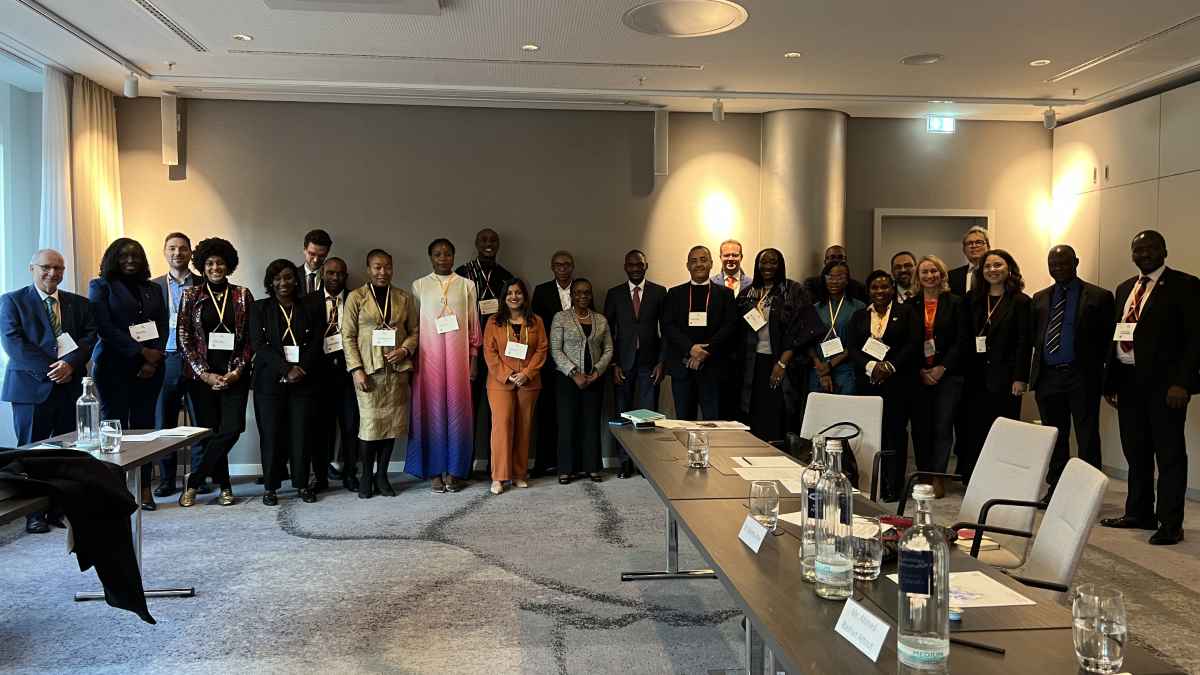The session was followed by a roundtable to stimulate networking between development institutions and African innovators
HAMBURG, Germany, October 14, 2024/APO Group/ —
African youth entrepreneurs supported the by African Development Bank Group (www.AfDB.org) took center stage at the Hamburg Sustainability Conference on Monday.
During a session, titled “Empowering Young Entrepreneurs in Africa,” executives of the African Development Bank and its partner the African Guarantee Fund (http://apo-opa.co/3Y78rMT), as well as young African business leaders showcased innovative approaches to bridging the financing gap for youth entrepreneurs.
The two-day Hamburg Sustainability Conference, which drew global leaders, development institutions and young business founders across the continent, featured high-level discussions on reshaping international financial systems and creating investment environments that promote achievement of the United Nations Sustainable Development Goals.
The session explored the impact of the Bank’s Affirmative Finance Action for Women in Africa (http://apo-opa.co/3Y3wpZI) initiative. Through AFAWA, the Bank has approved approximately $1.8 billion in lending for Africa’s women entrepreneurs; some $1 billion has already been disbursed to more than 18,000 women-led small and medium enterprises.
Melanie Keita, CEO and co-founder of Melanin Kapital (http://apo-opa.co/48alJNA), a Nairobi-based fintech company that provides digital loans, and a beneficiary of AFAWA, spoke about the need for more accessible financing options for Africa’s youth-led startups. She questioned whether there were plans to digitise the loan process: “Can people access loans from their living room instead of having to travel a lot of time and then go with a lot of paperwork and being denied loans sometimes?”
South Africa’s Minister in the Presidency Responsible for Planning, Monitoring, and Evaluation, Maropene Ramokgopa, told attendees that young African entrepreneurs are “drivers of change.” She urged governments to prioritise entrepreneurship policies and reduce bureaucratic barriers.
“From financial technology, agriculture, renewable energy and creative sector to digital health solutions, young African entrepreneurs are transforming their communities,” Ramokgopa added. “They are also creating jobs and reshaping the economies as well.”
Africa is facing a significant demographic shift: the continent is expected to be home to 1.4 billion people aged under 25 by the year 2063.
We need to build an entrepreneurial culture that supports solid institutional and regulatory frameworks
Ahmed Attout, Director for Financial Sector Development at the African Development Bank, introduced its Youth Entrepreneurship Investment Banks (YEIB) initiative, designed to de-risk investing in youth entrepreneurs while fostering talent and entrepreneurship across Africa.
“[The Youth Entrepreneurship Investment Banks initiative] is a one-stop shop that can give youth access to finance, employment guarantees, employment technical assistance,” Attout said, adding that the initiative is in the advanced implementation phase in Liberia and Ethiopia.
Jules Ngankam, CEO of the African Guarantee Fund, an implementing partner of AFAWA, announced significant progress in delivering solutions for entrepreneurs. He said the Fund has issued $3 billion in guarantees, enabling commercial banks to lend $5 billion to small and medium-sized enterprises.
The session was followed by a roundtable to stimulate networking between development institutions and African innovators. Joining Keita at the roundtable were two other beneficiaries of the Bank’s support: Chiemela Anosike, founder and CEO of Solaris GreenTech (http://apo-opa.co/48alKkC), and Ebun Feludu, CEO of Kokari Coconuts & Company (http://apo-opa.co/3A6ibiv), both Nigeria-based.
Chiemela Anosike said the struggle for start-up success is real. “Entrepreneurship is hard. Entrepreneurship in Africa is harder…so, it’s difficult. So, we have programs like this…but then you give us another full-time job because you’re into fundraising and then it’s taking six months. You’re developing just one proposal [for financing] and it’s taking one month plus,” Anosike told roundtable participants.
Bank Director for Human Capital, Youth and Skills Development Martha Phiri told the entrepreneurs that the Bank is integrating entrepreneurship skills into its vocational training programs, in recognition that not all graduates will find employment in existing job markets.
Tapera Muzira, the Bank’s Lead Expert for Human Capital, Youth and Skills Development said the Bank’s Innovation and Entrepreneurship Lab (http://apo-opa.co/3YqnotZ), an online platform that connects African entrepreneurs with resources, financing, and business development services, is closing the information gap that limits youth potential to contribute to economies and communities.
Earlier, Norway’s Minister of International Development, Anne Beathe Tvinnereim, noted that her country is committed to supporting African youth entrepreneurship. She referenced the USAID and Norway-led Financing for Agricultural Small-and-Medium Enterprises in Africa program, a multi-donor fund designed to spur investment in Africa’s agricultural growth.
“African youth constitute 60% of the population, which is why youth engagement and involvement is central in Norwegian foreign and development policies. Financing entrepreneurs is not enough. We need to build an entrepreneurial culture that supports solid institutional and regulatory frameworks,” Tvinnereim said.
The Hamburg Sustainability Conference is organized annually by the United Nations Development Program, the German Federal Ministry for Economic Cooperation and Development (BMZ), the Michael Otto Foundation for Sustainability (http://apo-opa.co/48alMJg) and the City of Hamburg.
Distributed by APO Group on behalf of African Development Bank Group (AfDB).


 Energy4 days ago
Energy4 days ago
 Business4 days ago
Business4 days ago
 Business4 days ago
Business4 days ago
 Energy3 days ago
Energy3 days ago
 Business4 days ago
Business4 days ago
 Business4 days ago
Business4 days ago
 Energy4 days ago
Energy4 days ago
 Energy3 days ago
Energy3 days ago












